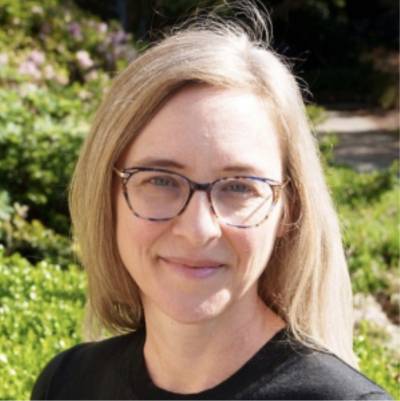
This spring, recently tenured Dr. Sarah Pourciau has taught “Virtual Realities: Collective Dreams from Plato to Cyberspace.” Given the popularity the class has enjoyed among undergraduate students, we asked Dr. Pourciau a few questions about the topic of VR and what she thinks German Studies can contribute to the ongoing conversation.
What are your current research interests and projects?
Currently I am working on the intersection between the history of mathematics and the history of philosophy, as well as the pre-history of the digital. I am asking questions about the historical relationship between notions of number and thinking, the finite and the infinite, imagination and computation. I am interested in how these questions intersect with the German philosophical tradition, given the fact that much of the mathematics underlying the contemporary computational paradigm and our contemporary understanding of number was developed in German-speaking contexts by German mathematicians.
How did you come up with the idea of teaching a class on Virtual Realities?
I wanted to offer a course that could appeal to a wide swath of students, and that would let me bring the history of philosophy to a place that students would find interesting. Working with the material in an introductory way yields new insights, so it is fun for both students (I hope) and for me. It’s helped me stumble across some surprising connections that have influenced my own research.
In light of the debates regarding AI technologies such as ChatGPT, what do you think the stakes of ChatGPT are?
The question about ChatGPT is: what does it do? What does it make possible? What possibilities if any does it foreclose? I don’t think there’s any question that it’s generating real language. Does that mean it’s really thinking? Does that mean we need to uncouple language and thinking or do we need to change the way we think about both of these categories? Do we need a new understanding of what language does and is in order to make room for (or definitively exclude) an inhuman model of language production? What happens to our concept of linguistic meaning when you subtract the possibility of referential grounding? The chatbot has no access to a physical world “outside” of the language that makes up the internet, but there are plenty of concepts we use all the time for which we also don’t have this kind of language-external, physical access to a referent. Is this a meaningful distinction? Do we need a different mode of reading, interpreting, analyzing, or even “chatting” in order to make sense of our interactions with large language models? Why or why not? These are some of the kinds of questions I think we need to answer for ourselves in order to grapple productively with what’s happening.
This course encompasses a variety of topics and is highly interdisciplinary as well as up-to-date. What has inspired you to design the course this way?
I wanted to present a historical overview of virtual reality conceptions through the ages and across genres so that we can track both continuities and breaks. One of the things that has been interesting for the students (and for me!) to realize, is that the notion of the “virtual” has stayed far more stable than the notion of “reality.” But obviously both have morphed, particularly with the advent of the computational/digital paradigm. I think it’s really important to look at these large-scale historical shifts in order to establish a vantage point from which to be able to analyze contemporary developments. That’s why the syllabus continually bounces back and forth between the models of virtuality that have shaped western culture, like Leibniz, Kant, and Calderon, and the models that are on the table today, whether they’re playing with that tradition--like Everything Everywhere All at Once and the Blade Runner franchise—or upending it, like ChatGPT.
What kinds of ideas did you want to convey to the students in this class?
We are surrounded by text (both in the sense of actual linguistic text and of images that need to be read). I think the most important thing I can do for students in the classroom is give them the tools to get an analytical toehold inside this textual universe. If we can’t read the stuff we’re bombarded with, we will drown in it. Many topics and tropes follow a historical trajectory, and if you see these kinds of patterns over and over again then the chances that you will recognize them later, in new contexts, is much higher, and if you can do that then you are already halfway to being able to analyze the new uses to which they’re being put. I want to prepare students to actively intervene in contemporary debates over meaning: who makes it, who controls it, who profits from it, who can change it. This feels to me like our number one responsibility as humanists and teachers.
What have been the most enjoyable experiences for you in the classroom?
It has been super rewarding to see that the give-and-take conversation style I associate with seminars can also work well in a lecture format. I did plenty of actual lecturing/talking! But it has been great to see the students so engaged and involved. I also genuinely enjoyed the challenge of preparing lectures about famously hard thinkers. We tackled Leibniz, Descartes, Kant, Nietzsche, Baudrillard, Turing, and Haraway. But we did it together with so many films and games and stories that it never really felt that much like actual work (at least to me, they might say something different if you were interviewing them). And it was also really good for me to be forced to articulate to a bunch of young people in 2023 why they should care about thinkers like this with their crazy writing styles and seemingly insane ideas. I’m delighted and honored that so many of them were willing to follow me all the way to the ends of this weird and amazing corner of the intellectual map.